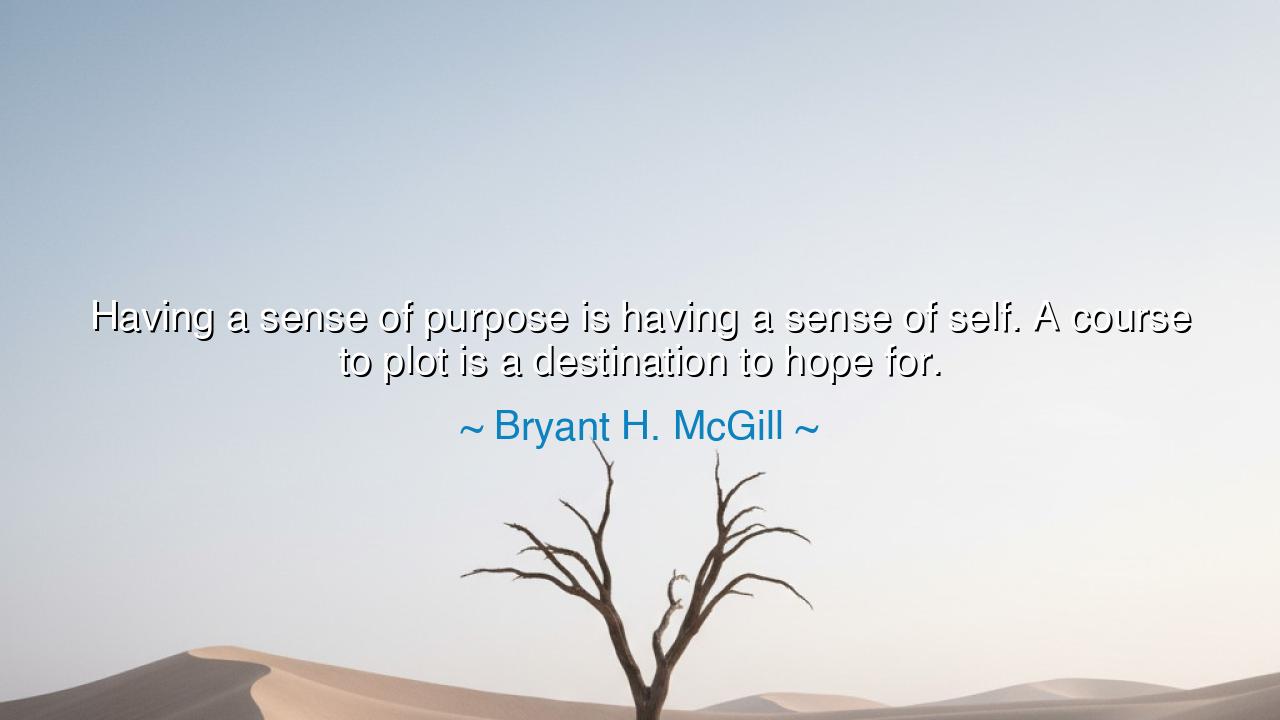
Having a sense of purpose is having a sense of self. A course to
Having a sense of purpose is having a sense of self. A course to plot is a destination to hope for.






The philosopher and writer Bryant H. McGill once spoke with profound clarity when he said: “Having a sense of purpose is having a sense of self. A course to plot is a destination to hope for.” In these few words lies an ancient truth, one that has guided humankind since the dawn of thought: that to live without purpose is to drift like a ship without a rudder, but to live with it is to move with strength, dignity, and direction. McGill, a modern sage of reflection, reminds us that purpose is not merely a goal—it is the root from which identity itself springs. When a person knows why they rise each morning, they no longer wander; they walk the path of their own becoming.
To say that “having a sense of purpose is having a sense of self” is to declare that meaning and identity are one and the same. Without purpose, the soul dissolves into uncertainty, chasing every wind that blows across the mind. But with purpose, one stands firm, unshaken by chaos, for they know who they are and what they are called to do. Just as a tree draws its stability from its roots, so too does the human spirit draw strength from the deep conviction of purpose. It is through this knowing that a man or woman becomes whole. The ancients knew this well: the Greeks called it telos—the divine aim that gives life its direction and the heart its peace.
The second part of McGill’s saying—“A course to plot is a destination to hope for”—is equally filled with wisdom. To plot a course is to choose one’s direction, to set the sails of life toward something meaningful. Hope is not found in still waters, but in the voyage itself. The sailor does not despair because the horizon is far away; he rejoices because it gives him something to steer toward. Likewise, when we set our sights upon a worthy purpose, no matter how distant, we awaken hope within us. That hope becomes our compass—it carries us through storms and uncertainty, reminding us that though the journey is long, it is worth taking.
This truth has been proven again and again through the stories of those who changed the world. Consider Nelson Mandela, who spent twenty-seven years in prison, stripped of freedom, comfort, and the very life most would cling to. Yet he endured, not because he was free, but because he had a purpose—to liberate his people and restore the dignity of South Africa. His sense of destiny gave him identity; his vision gave him direction. Though his body was confined, his soul remained vast and unbroken, for his course was clear, and his hope unwavering. When he was released, he said not that his journey had ended, but that it had only just begun.
History and philosophy alike teach us that when purpose departs, life itself begins to fade. The wandering of the soul without aim is more perilous than any prison, for it leads to despair, confusion, and the dullness of spirit. It was the same lesson the Stoics spoke of when they said, “If a man does not know to what port he sails, no wind is favorable.” Without direction, every effort is wasted. But once the heart discovers its harbor—whether it be love, justice, creation, or service—then even the storms of life become instruments of progress. To have purpose is not merely to live; it is to live intentionally, with every breath moving toward something that transcends the self.
Yet McGill’s words also whisper a gentler truth: that purpose need not always be grand. The course to plot may not lead to kingdoms or glory; it may be as simple as tending to one’s family, healing a wound, or creating beauty in a quiet corner of the world. What matters is not the scale of the destination, but the sincerity of the journey. Even the smallest purpose gives shape to the soul, as a single candle drives back the darkness. And as we walk that path faithfully, our sense of self deepens, for we become the very thing we strive toward.
So, my child, take this teaching into your heart: do not drift without direction. Seek your purpose—not in the noise of the world, but in the quiet knowing of your own heart. Ask yourself: what calls to me? What gives me life? What am I willing to struggle for? When you answer these questions with honesty, you will find the map of your own soul. Then, plot your course, and set forth with courage. There will be storms, yes—but there will also be stars to guide you, and horizons that promise renewal.
For as Bryant H. McGill reminds us, to live with purpose is to live with identity, and to walk with hope is to be fully alive. Let your purpose become your anchor and your sail—steadying you in stillness, propelling you through change. For the one who knows their purpose is never lost, and the one who moves with hope already carries the destination within them.






AAdministratorAdministrator
Welcome, honored guests. Please leave a comment, we will respond soon